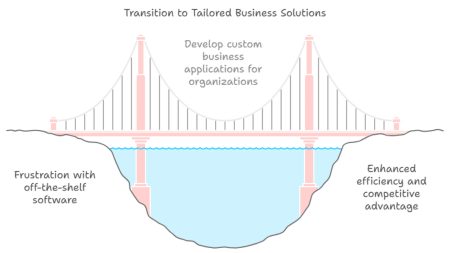Decoding the Dilemma
In house vs outsourcing software development services? When it comes to building software, the million-dollar question often boils down to this: Should you keep the work in-house or pass the baton to an outsourcing partner? This is not just a technical conundrum; it’s a strategic crossroads that can shape your business future. Let’s explore outsourcing software development pros and cons, so you can make a well-oiled decision.
The Battle of Control vs. Cost
In-house software development is like cooking at home. You’ve got full control over the ingredients, the recipe and the outcome. However, it also means you’re the one buying the groceries, cleaning up the mess, and figuring out why your soufflé sank. On the flip side, outsourcing is akin to dining out. You hand over the menu to someone else and expect a tasty dish in return – at a cost.
So what is the best in this case – in house software development vs outsourcing? Control and cost are the two heavyweights in this debate. In-house teams let you steer the ship, but the expense can pile up like a surprise bar tab. Outsourcing offers financial relief, but you might lose the ability to tweak things mid-project. So, what’s the real deal?
The Cost Equation Is Not Just About Dollars and Cents
In house vs outsourcing software development? Running an in-house team isn’t cheap. You’ve got salaries, benefits, office space, training, and don’t forget the coffee machine. According to a 2023 survey by Glassdoor, the average software developer in the U.S. earns around $110,000 annually. Add in overhead costs, and that number can double. Hiring doesn’t just cost money; it also takes time.
The Society for Human Resource Management estimates it takes 42 days on average to fill a tech role. Software outsourcing, by contrast, often carries a smaller sticker price, especially if you’re working with teams in countries where labor costs are lower. But it’s not all sunshine and rainbows. Hidden fees can sneak up on you, and misunderstandings across time zones can delay progress. The phrase “you get what you pay for” exists for a reason.
Talent Wars Are Finding the Right Fit
What is more profitable in this case – in-house vs outsourcing software development? Hiring in-house is like scouting for talent on a dating app. You’re swiping through resumes, hoping to find “The One.” But tech talent is in high demand and short supply. LinkedIn’s 2023 Workforce Report highlighted that the tech sector has one of the highest turnover rates, at 13.2%.
Training your team is also an ongoing commitment – think of it as feeding a Tamagotchi. Forget for a day, and productivity suffers. Software development outsourcing skips the hiring drama. Companies like Toptal, Fiverr, and Accenture connect you with ready-to-go experts. But beware: Not every outsourced developer will fit your company’s vibe. Misaligned goals or communication styles can feel like trying to tango with two left feet.
The Flexibility Factor & Adapting to Change
The tech world moves faster than a caffeinated squirrel. Your business needs to pivot, adapt, and scale without breaking a sweat. In-house software development teams give you the flexibility to shift priorities quickly. Need a new feature tomorrow? Just call a meeting. Outsourcing, on the other hand, often involves formal contracts. While that can protect you, it’s also like wearing a straitjacket when you need to sprint. Changing requirements mid-project can mean renegotiating terms, which costs both time and money.
Who’s Watching the Watchers in QA?
Who is the top in this case – in-house vs outsourcing software development? Building software is a lot like constructing a house. A crack in the foundation (read: code) can bring the whole thing down. With an in-house team, quality control stays firmly under your roof. You can implement processes like code reviews and testing cycles tailored to your standards.
Software outsourcing shifts quality assurance to an external team. While many outsourcing firms have stellar track records, others cut corners. Gartner’s research shows that 20% of outsourced software projects fail to meet quality expectations. To avoid a lemon, vet your partners like you would a used car dealer.
Security and Intellectual Property
Your software often contains sensitive data or proprietary algorithms. Keeping development in-house minimizes the risk of leaks or breaches. You’re the gatekeeper. Outsourcing requires trust. While most providers uphold strict confidentiality agreements, breaches can still happen. According to IBM’s 2023 Cost of a Data Breach Report, the average data breach costs $4.45 million. That’s a lot of zeros to gamble with.
Which Approach Wins – In House vs Outsourcing Software Development?
An in-house team might seem like a productivity powerhouse. After all, they’re on your payroll and fully focused on your project. But the truth isn’t always rosy. Office distractions, burnout, and mismanagement can slow progress. Outsourced teams, especially those working on fixed deadlines, often bring laser-sharp focus. But they’re not immune to delays either. Miscommunication can derail timelines faster than a missed train.
Case Studies & Real-World Examples
Success Story of In-House Development
Slack, the workplace communication tool, is a poster child for in-house development. By keeping their engineering team close, they maintained tight control over product design and quickly iterated based on user feedback. The result? A tool that’s now a staple in millions of workplaces.
Cautionary Tale About Outsourcing Challenges
Remember the healthcare.gov debacle in 2013? The U.S. government outsourced the website’s development to multiple contractors. Poor coordination led to a buggy launch, costing taxpayers millions and causing widespread frustration. It’s a reminder that outsourcing isn’t a silver bullet.
The Role of Scalability in Decision-Making
When planning for growth, scalability becomes the elephant in the room. In-house teams can handle scaling – but at a cost. As projects expand, so do hiring needs, infrastructure, and training requirements. For startups, this can be a tightrope walk between ambition and budget constraints.
Outsourcing, by contrast, can offer elasticity. Need ten extra developers for six months? Outsourcing vendors can make that happen without long-term commitments. But scaling through outsourcing also comes with risks: quality consistency can waver as more hands join the pot.
The Hidden Hurdles In Communication and Collaboration
Seamless collaboration is the backbone of successful software development. In-house teams benefit from face-to-face interactions, instant feedback loops, and shared office culture. Yet, even here, misaligned priorities or office politics can disrupt harmony. Outsourcing often introduces communication barriers. Time zones, language differences, and varying work practices can complicate collaboration. A study by McKinsey found that 45% of outsourcing projects fail due to communication breakdowns. To counter this, regular updates, clear documentation, and dedicated liaisons are crucial.
Cultural Compatibility
Software isn’t just lines of code; it’s a product of creativity, understanding, and alignment with business goals. In-house teams tend to internalize a company’s culture, values, and mission. This alignment can lead to intuitive solutions that resonate with the brand identity. Outsourced teams might lack this cultural sync. While technical skills can bridge some gaps, a disconnect in understanding the “why” behind the project can lead to missteps. Bridging this gap requires deliberate effort, including onboarding sessions and cultural immersion.
Balancing the Scale in Risk Management
Every project involves risks, from budget overruns to missed deadlines. In-house development allows you to closely monitor and mitigate these risks. You’re in the driver’s seat, adjusting as you go. Outsourcing shifts some risks onto the vendor. While this can be a relief, it’s not foolproof. If a vendor faces challenges – be it financial instability or talent shortages – your project could suffer collateral damage. Choosing a reliable partner with a proven track record is non-negotiable.
The Hybrid Model: Best of Both Worlds?
Why choose one path when you can embrace both? The hybrid model combines in-house teams with outsourced talent. For example, core functionalities might stay in-house for security and control, while auxiliary features are outsourced to speed up delivery. Companies like Microsoft and Apple often use this approach. They maintain tight control over flagship projects but leverage global talent for supplementary tasks. It’s a strategy that offers flexibility without compromising quality.
Choose the Right Path
Here’s a quick checklist to help you decide between in-house vs outsourcing software development:
Go In-House Software Development If:
- You need tight control over the project.
- Your project involves sensitive data.
- Long-term development is a priority.
Opt for Outsourcing Software development If:
- Cost is a major concern.
- You need specialized skills for a short-term project.
- Speed to market is critical.
Striking the Right Balance
The debate between in-house software development vs outsourcing isn’t about finding a one-size-fits-all solution. It’s about knowing your needs, resources, and goals. Think of it like choosing between a DIY home project and hiring a contractor. Both have their merits; it just depends on what you’re building. So, what’s your next step? Whether you’re rolling up your sleeves or dialing an expert, make your decision with eyes wide open. The right choice today could be the difference between smooth sailing and stormy seas tomorrow.
Also you can read interesting topic about Ruby On Rails Outsourcing.











